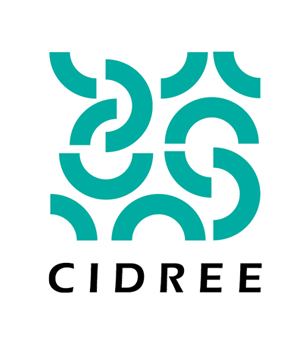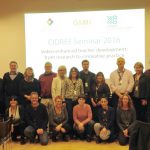Improving Literacy Skills across Learning
hosted by the Hungarian Institute for Educational Research and Development HIERD
On 5th November 2015, CIDREE held its annual conference in Budapest. The CIDREE yearbook 2015, Improving Literacy Skills across Learning, edited by HIERD, was launched at the conference. Dr József Kaposi, the Director General of HIERD and Alan Armstrong, President of CIDREE welcomed the participants.
The first keynote speaker, Dr Christine Garbe, coordinator of the European Literacy Policy Network, presented the aims and achievements of ELINET, while inviting CIDREE members to consider joining the network. The second keynote speaker, Dr Petra Aczél, Director of the Institute for Behavioural Sciences and Communication Theory at the Corvinus University of Budapest, spoke about the challenges of literacy education in the 21st century. The third keynote speaker of the day, Dr Gábor Halász, Director of the Centre for Higher Education Management at the Faculty of Education and Psychology of ELTE, and HIERD scientific advisor, presented Education in Hungary: Challenges and Recent Developments. Following the plenary session, a literacy café took place, conference participants could join in discussions at six different thematic tables.
After the discussions, Alan Armstrong launched the yearbook Improving Literacy Skills across Learning. The ten articles of the volume (edited by HIERD) centre on the topic of literacy, presenting national projects/case studies to improve literacy skills (Slovenia, Scotland), research articles about genres in textbooks (Netherlands) and teachers’ questions in relation to supporting text comprehension (Estonia), curricular changes to develop multiliteracy (Finland, France), tests of literacy (Sweden), the aim of literacy education (Ireland), and examples of European projects to tackle struggling readers (BaCuLit and ISIT). The Hungarian article, written by HIERD colleagues Katalin Varga, László Kojanitz, Ambrus Dobszay and Gergely Wintsche examined how the new generational textbooks improve literacy skills.
The yearbook was presented by editor Viola Bozsik. All countries seemed to acknowledge that literacy is the responsibility of all teachers, throughout secondary education. Awareness also characterised the articles as a common theme: being aware that the language of schooling can be very different from the language of the student. Similarly, reflection is expected from students and teachers and education experts alike. The Hungarian process of developing textbooks heavily relying on the feedback from teachers is also an outstanding example of this attitude, as well as the emphasis on formative assessment. Finally, the acknowledgment of complexity was present in all articles: the notion of multiliteracy has replaced traditional literacy, as the concept summing up what we expect from education. Also, more and more links are established between subjects, for example in the form of interdisciplinary learning modules, as a mapping of our complex world.
In the afternoon, four workshops were held about Cognizing literacy. At the end of the day, a panel of experts answered questions gathered by the rapporteurs from the literacy café and the workshops.
The CIDREE conference ended with a gala dinner, and it was followed by the CIDREE General Assembly the next day. The topic of the 2016 yearbook is raising attainment of low achievers, edited by Scotland, to which Hungary also plans to contribute.
CIDREE Conference Report Budapest 2015 (PDF)
More information, presentations, pictures
http://ofi.hu/en/hierd-hosts-cidree-conference



